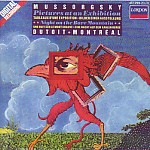Charles Dutoit’s Montreal legacy on Decca is not holding up terribly well. Since that initial recording of Daphnis et Chloé caught the attention of the public and critics alike at the very beginning of the digital recording revolution, it has become very obvious that these recordings often do not rise to the level of the best of the competition–particularly in the “blockbuster” repertoire that supposedly represented this team’s specialty. That makes this “on-demand” Arkivmusic.com release a less than urgent proposition. For example: Pictures is good, but lacks any hint of real Russian earthiness in Gnomus or Bydlo; the Ballet of the Chicks in their Shells is a touch mechanical, Limoges is labored, and The Great Gate needs more weight at Dutoit’s broad tempo. The Russian Easter Overture is saved at the end by the orchestra’s excellent trombone section, while A Night on Bald Mountain is simply too tame. The engineering matches the interpretations: clear, but a touch pale and lacking in heft. Redundant.
































